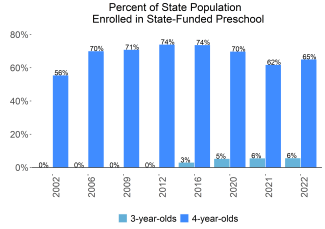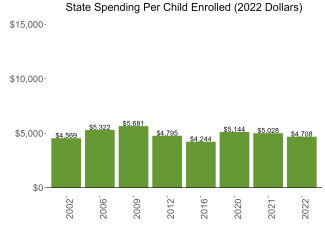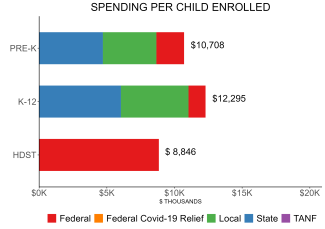
State of Preschool
Oklahoma
Access Rankings
Resource Rankings
Total Benchmarks Met


Overview
During the 2021-2022 school year, Oklahoma preschool enrolled 39,240 children, an increase of 790 from the prior year, as the program began to recover from the impact of the COVID-19 pandemic. State spending totaled $184,734,990, down $8,606,291 (4%), adjusted for inflation since last year. State spending per child equaled $4,708 in 2021-2022, down $321 from 2020-2021, adjusted for inflation. Oklahoma met 9 of 10 quality standards benchmarks.
What's New
A number of new initiatives were launched at the Oklahoma State Department of Education (OSDE) during the 2021-2022 school year in support of quality early childhood programming. To support teachers and administrators with foundational reading instruction, OSDE developed a suite of nine professional learning modules, the From the Start Reading Project, exploring knowledge and practice of early literacy grounded in the science of reading. Additionally, OSDE allocated $2.5 million dollars of federal relief funding to launch Dolly Parton’s Imagination Library of Oklahoma, a book gifting program delivering high-quality, age-appropriate books each month to children birth to five.
To support schools in boosting enrollment in pre-k, a Ready Together guidance document and an associated toolkit were provided to districts. In the summer of 2022, OSDE supported the Oklahoma Head Start Collaboration Office in hosting the first ever Early Childhood Transition Summit. The Summit brought together over 100 participants from public school, Head Start, child care, and SoonerStart (Oklahoma’s early intervention program) to engage in a day of learning and collaborating to ensure successful transitions for students and families.
In December 2022, Oklahoma was awarded a federal Preschool Development Grant Birth through Five (PDG B–5) renewal grant for $12 million. Funds are planned to be used for improving infrastructure, including streamlined data collection and usage through the expansion of the Early Learning Inventory and creation of an Early Childhood Integrated Data System.
Background
Oklahoma launched its Early Childhood Four-Year-Old Program in 1980, intending to serve all 4-year-olds in the state. In 1990, the program received statewide funding for 4-year-olds eligible for the federal Head Start program, but local areas could choose to serve additional 4-year-olds with local funds or tuition. In 1998, Oklahoma became the second state in the nation to provide free preschool for all 4-year-olds, with 100% of school districts providing the program. In addition, funding for 3-year-olds is provided by the Oklahoma Early Childhood Program (OECP) through a pass-through from the state to public school districts.
In spring 2020, the Oklahoma State Legislature approved revisions to the Oklahoma Academic Standards for Science and Fine Arts, which both included pre-K standards and emphasized play-based learning. Also passed was legislation requiring an additional layer of support for a more detailed review of instructional materials for grades PK–12. Facilitated by the OSDE, a committee of expert educators are reviewing materials to establish Tier 1, 2 or 3 level instructional materials based on a robust, subject and grade level specific rubric.
Oklahoma Early Childhood Four-Year-Old Program
Access
Resources
| Total state pre-K spending | $184,734,990 |
| Local match required? | No |
| State Head Start spending | $1,806,005 |
| State spending per child enrolled | $4,708 |
| All reported spending per child enrolled* | $10,708 |

Pre-K programs may receive additional funds from federal or local sources that are not included in this figure. K–12 expenditures include capital spending as well as current operating expenditures. Head Start per-child spending includes funding only for 3- and 4-year-olds.
Oklahoma Quality Standards Checklist
| Policy | Requirement | Benchmark | Meets Benchmark? |
|---|---|---|---|
For more information about the benchmarks, see the Executive Summary and the Roadmap to State pages. | 9benchmarks met | ||
| Early Learning & Development Standards Benchmark | Comprehensive, aligned, supported, culturally sensitive | Comprehensive, aligned, supported, culturally sensitive | |
| Curriculum Supports Benchmark | Approval process & supports | Approval process & supports | |
| Teacher Degree Benchmark | BA | BA | |
| Teacher Specialized Training Benchmark | ECE | Specializing in pre-K | |
| Assistant Teacher Degree Benchmark | HSD | CDA or equivalent | |
| Staff Professional Development Benchmark | 15 hours/year; PD plans; Coaching | For teachers & assistants: At least 15 hours/year; individual PD plans; coaching | |
| Maximum Class Size Benchmark | 18 (3-year-olds); 20 (4-year-olds) | 20 or lower | |
| Staff to Child Ratio Benchmark | 1:9 (3-year-olds); 1:10 (4-year-olds) | 1:10 or better | |
| Screening & Referral Benchmark | Vision, hearing, immunizations | Vision, hearing & health screenings; & referral | |
| Continuous Quality Improvement System Benchmark | Structured classroom observations; Data used for program improvement | Structured classroom observations; data used for program improvement | |

